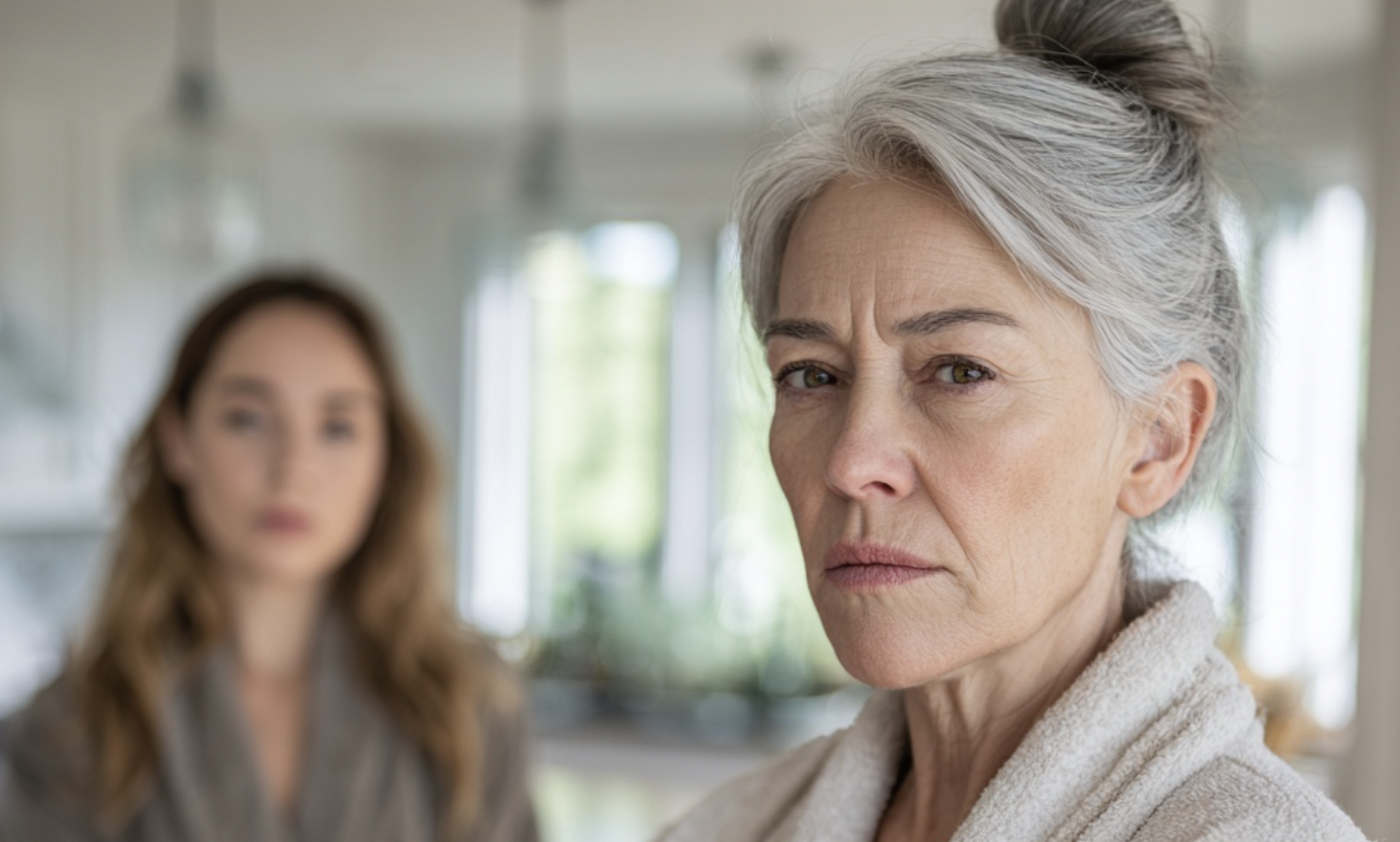Natalya’s story—the first time she told the truth
Natalya stood at the stove, slowly stirring the oatmeal. The kitchen was so quiet that even the faint crackle of the gas seemed loud. Outside, a cold dawn tinted the sky a grayish blue—the color of someone’s eyes who has been tired for a long time but is still holding on.
“Natash, you didn’t forget we need to take Mom’s blood pressure before breakfast, did you?” Viktor’s sleepy voice drifted from the bedroom.
“I didn’t forget,” she answered automatically, though it wasn’t on her mind at all.
She glanced at her reflection in the windowpane: dull eyes, fine lines, hair clumped at the roots. There was a time she wouldn’t leave the house without makeup. Now the main thing was to get the herbs steeping by eight a.m.
Raisa Dmitrievna, her mother-in-law, appeared in the doorway, leaning on a cane. Every movement had a touch of theatrics, as if she were playing the role of a sufferer.
“We ought to wash the curtains in the living room today. And the hallway rugs—so dusty it scratches my throat,” she declared without a greeting.
“Today is Wednesday… window-washing day. I was planning—”
“Planning,” the mother-in-law cut her off. “And I have asthma. Or do you not care anymore about an old person’s health?”
Natalya knew there was no point in arguing. Any objection would be met with manipulative complaints about illness.
Viktor shuffled into the kitchen, scratching his belly under his T-shirt.
“Ma’s right. It’s dusty. Toss the curtains in the machine, and I’ll wash the windows on the weekend… if I don’t forget.”
“Of course,” Natalya said softly, feeling a heavy lump rise in her chest.
By nine a.m. the kitchen sparkled. Raisa Dmitrievna sat knitting, commenting on Natalya’s every move.
“What is that you’re wearing? A gray sweater? It washes out your face. I told you—lilac suits you.”
Natalya’s hands burned from the cleaning chemicals. The anger was building, but as always, she kept quiet.
In the afternoon she sat down at her laptop—there were accounting reports to check. But at home no one took her work seriously.
“You’re at home anyway,” Viktor would say. “What’s so hard about your stuff?”
By evening, Raisa Dmitrievna reminded her again:
“Tomorrow you need to go to the market for potatoes. Two sacks—one for the winter, one for mashed.”
“I have a report and a call with the tax office tomorrow,” Natalya ventured cautiously.
“Don’t carry them yourself, call a taxi. Everyone’s lazy these days. Back then we women hauled two buckets from the garden.”
Before bed she looked at her face in the mirror—sluggish, lifeless. Next to her face cream stood bottles of her mother-in-law’s drops and boxes of her husband’s pills. She turned off the light.
In the morning Natalya got dressed without making breakfast and without taking blood pressure. She simply walked out and pulled the door shut.
The bus carried her slowly away from the eternal “you must.” Fields passed outside the window, scattered villages. With every kilometer she could breathe a little easier.
She went to see Tatyana—a friend who’d moved to a country house by the forest.
“You looked like a wrung-out rag back at the pharmacy,” Tatyana said, pouring tea. “I was thinking whether to call you or not… And here you are.”
“I left,” Natalya said quietly.
The next day she turned off her phone. For the first time in ten years, no one asked where their socks were, whether she’d salted the soup, or which pills to give.
Four days later she turned it back on: 36 missed calls from Viktor, 9 from his sister, 2 voice messages from her mother-in-law:
“We’re worried. This isn’t right. Come back.”
Natalya looked at the phone and stepped out into the misting rain. “If I go back—everything starts over. And if I stay?”
Two weeks later she returned. Raisa Dmitrievna gasped; Viktor turned pale.
“We need to talk,” Natalya said firmly. “All of us.”
“You abandoned us!” her mother-in-law threw up her hands. “I nearly called an ambulance!”
“Can you even imagine what it was like for me for ten straight years?” For the first time, Natalya looked them in the eye. “No days off. No respect. No voice…”
Raisa Dmitrievna froze with her mouth open, as if Natalya had just cursed in front of a child.
“How dare you?” she finally exhaled. “I don’t respect you? I treated you like a daughter…”
“Like hired help,” Natalya said evenly. Her voice was quiet, but her words cut the air. “For ten years I washed, cleaned, cooked, mopped, ran to the markets. And all of it—without gratitude. Without the right to say ‘no.’”
Viktor took a step forward, but Natalya raised her hand.
“Don’t interrupt. You listen too.”
He stopped, frowning.
“I’m tired. I can’t live with my days scheduled by your demands anymore. I am not an orderly, not a maid, not a free caregiver. I’m a wife. I’m a person.”
Raisa Dmitrievna sprang to her feet.
“Then say you’re tired of helping a sick woman!”
“No,” Natalya looked straight into her eyes. “I’m tired of my life belonging to you.”
⸻
Silence hung in the room. The clock on the wall ticked softly, and a bus droned past outside.
“So what are you proposing?” Viktor asked dully.
“New rules,” Natalya answered calmly. “I work. My time is mine. I’m willing to help, but not around the clock and not at the expense of myself. I will have my own space and my own plans. And if someone doesn’t like that…” She hesitated, then finished, “then I’ll leave for good.”
Raisa Dmitrievna snorted indignantly:
“And who would want you with your ‘rules’?”
“I do,” Natalya said. “I want myself.”
⸻
Viktor turned to the window. Natalya noticed his hands clench into fists. He wasn’t the kind of man who knew how to admit mistakes. But right now he seemed to understand: if he said even one word “the way it used to be,” she would walk out today.
“Fine,” he said at last. “We’ll try.”
Raisa Dmitrievna exploded:
“What do you mean, ‘we’ll try’?! She’s your wife, she has to—”
“No one owes anyone anything,” Viktor said to his mother wearily. “Mom, enough.”
Those words took Natalya by surprise. She hadn’t believed he could ever once stand up for her.
⸻
The first days after her return felt strange. Natalya deliberately didn’t take on everything at once. If Raisa Dmitrievna started dictating a list of chores, Natalya answered calmly:
“Not today.”
Sometimes her mother-in-law sighed theatrically or slammed cupboard doors, but Natalya stopped reacting.
She started getting up later than seven again. She spent more time working—not on the sly, but officially, behind a closed door. Viktor had to find his own socks.
In the evenings she let herself read. Not reports, not cooking tips, but the novels she used to love. At first it felt almost forbidden. But gradually the guilt receded.
⸻
A month later she had a new hobby—watercolors. She bought paints, brushes, a sketchbook. Viktor was surprised:
“What do you need that for?”
“For myself,” Natalya said simply.
They argued less. Viktor started doing the dishes after dinner himself. Not always, but without being asked.
As for Raisa Dmitrievna, she couldn’t accept it for a long time. Sometimes she still took a jab:
“Well sure, now we’ve got an artist. Not like before—a proper homemaker.”
But Natalya learned to let it go in one ear and out the other.
⸻
Six months later she grasped the main thing: she was no longer afraid to leave. And precisely because of that—she was in no hurry.
One warm spring evening she sat on the balcony with a cup of tea. Trees rustled outside; somewhere in the distance children laughed. Viktor came out and sat beside her.
“You’ve changed,” he said.
“I just came back to myself,” Natalya replied.
“You know…” he was quiet for a moment, “it’s gotten easier for me too.”
She looked at him in surprise.
“When you left, I realized we were living as if everything was endless. And then it turned out you could up and go. And I’d be left with Mom and an empty kitchen.”
He spoke softly, almost sheepishly.
“I don’t want you to leave,” he added. “But I understand if we go back to how it was… you’ll walk away yourself.”
For the first time in a long while, Natalya smiled.
“Then we have a chance.”
⸻
And the next day, when Raisa Dmitrievna again asked her to rearrange the furniture in the living room “while Viktor’s at work,” Natalya said:
“No, I’m painting today.”
And she went to get her brushes.
Raisa Dmitrievna stood in the doorway for a long time, then went back to her room, muttering under her breath:
“Everyone’s gone mad…”
But she didn’t say anything else.
Not used to being refused, she lingered another few minutes in the doorway, as if expecting Natalya to come to her senses and go move the furniture. But Natalya, seated at the table with her watercolors, didn’t even raise her head. At first the mother-in-law sighed loudly and tapped her cane on the floor, but when she got no reaction, she quietly withdrew to her room.
Inside, Natalya was trembling. Afraid she’d be accused of ingratitude, that Viktor would come home and pick a fight. But—silence. And that was almost strange.
She remembered how a year ago, when she had a fever, she still cooked dinner, mopped the floors, and ran to the pharmacy for her mother-in-law’s drops. Back then she thought, “Well, who else if not me?”
Now the thought was different: “And why is it always supposed to be me?”
⸻
That evening Viktor came home from work with a bag of bread and milk.
“Ma, I’ll move the furniture tomorrow,” he called toward his mother’s room. “I’m tired today.”
Natalya nearly dropped her brush when she heard it.
He didn’t ask why she hadn’t done it “like usual.” Didn’t throw a fit. He simply took responsibility.
“What’s that you’ve got?” he nodded toward the table.
“I’m trying to paint,” she said, bracing for a sneer.
“Well… it’s pretty,” he said awkwardly and went to the bathroom.
That “pretty” meant more to her than a whole bouquet of flowers.
⸻
But the calm didn’t last long.
A few days later, when Natalya was about to join an online work meeting, her mother-in-law walked into the kitchen:
“I was thinking… The balcony’s a mess, it needs sorting. You’re home—do it now.”
“No,” Natalya didn’t even look up from the laptop. “I have a meeting.”
“What meeting? You’re just sitting at home!”
“I’m working.”
“What kind of work is that?” mockery crept into her voice. “You’re sitting in a chair pushing buttons… Back in the day at the kolkhoz—”
“Raisa Dmitrievna,” for the first time Natalya said it without a tremor, “we live in the twenty-first century. I have a job, I have things to do. And I am not going to drop everything anymore just because you suddenly want something done.”
A pause.
“I see,” the mother-in-law raised her brows and left.
⸻
In the evening Viktor said quietly, almost apologetically:
“Mom complained today that you spoke to her rudely.”
“Viktor, not rudely—honestly. The difference is that before I kept quiet and did it, and now I say ‘no.’”
He nodded but looked puzzled.
“You’ll have to get used to it,” Natalya added. “It’s not a whim—it’s a new life.”
⸻
A week passed. Natalya felt her fears gradually recede. Now her mornings began with a cup of coffee on the balcony, not with racing around the kitchen. In the evenings she painted or read, sometimes went on long walks in the park.
One day on her way back from the market, she noticed an elderly woman struggling with a heavy bag. She helped carry it to the entrance, and the woman thanked her with a warmth Natalya hadn’t heard from her own family in a long time.
And suddenly she realized: respect comes when you respect yourself.
⸻
Two months later Viktor suggested they go to the seaside for a couple of days. Without his mother.
“She’ll stay with my sister,” he said, “and we’ll just… rest.”
On the beach, for the first time in many years, Natalya laughed freely. Without thinking about a to-do list waiting at home. Viktor seemed to relax too.
That evening, sitting by the water, he said softly:
“I didn’t know it could be like this. You not tired and irritable, but… happy.”
“Now you do,” she smiled.
⸻
When they got home, they found Raisa Dmitrievna displeased:
“Had your fun, did you? And I sat here alone!”
Viktor replied sharply, unexpectedly:
“Mom, we’re entitled to personal time. Natalya is, too.”
Natalya looked at him in amazement. It seemed he was starting to understand.
⸻
A year passed.
Natalya had her job, her hobby, and time for herself. Raisa Dmitrievna still sometimes tried to boss her around, but less and less. Viktor helped around the house more often, and on Sundays they would go for walks or take trips out of town together.
Most important—Natalya no longer felt caged. She knew if things ever slipped back to the way they were, she would leave. And that readiness gave her freedom.
That evening, clearing the table, she caught herself thinking:
“I’m living again. And I’m not their orderly or their maid. I am me.”
When Natalya first came to Tatyana’s, she was almost an empty shell. Her eyes looked at the world as if through gray glass, her hands trembled, and her shoulders were tight from years of strain.
“Sit,” Tatyana said gently, pointing to the porch with a swinging bench. “Tea?”
Natalya nodded. The tea brewed in the old samovar felt like a small miracle. It was warm, fragrant, and with every sip Natalya felt the tension slowly leaving her shoulders.
“Don’t be afraid to be quiet,” Tatyana said. “You can just sit and breathe.”
Natalya didn’t know what to say. At home her voice always drowned in her mother-in-law’s orders and her husband’s indifference. Here no one demanded reports, no one checked whether everything was prepared “properly,” there was no constant “you must.”
“How do you live here alone?” Natalya asked after a few minutes.
“Not entirely alone,” Tatyana smiled. “But exactly the way I want. I work in the garden, read, paint, sometimes have guests. The main thing is—I can hear myself.”
For the first time, Natalya understood: hearing yourself is not the same as following other people’s instructions.
⸻
The next day Tatyana took her to the market. There was no familiar pressure there: no one hurried her, no one checked her shopping. Natalya picked out vegetables, studied each item, and for the first time in years realized she was doing it for herself, not because “that’s what needs to be done.”
“Look,” Tatyana pointed at a basket of radishes, “you can be happy about little things like this.”
For the first time, Natalya smiled the way she hadn’t in a long time.
⸻
In the evening they sat by the stove, watching the fire and listening to the forest whisper outside the walls. Natalya told Tatyana everything—about the house, her mother-in-law, Viktor, about how she had lived ten years without the right to say “no.”
Tatyana listened, nodded, and only once said:
“You know, you always had a choice. You were just afraid to make it.”
“I was afraid of destroying the family,” Natalya said quietly.
“And now you see that what destroys a family isn’t ‘no,’ it’s silence when you’re being used.”
Those words felt like a door opening inside Natalya. For the first time she felt: yes, it can be different.
⸻
The following days Natalya spent in the village, learning small joys: lighting the stove, the smell of fresh bread, the morning chime of the bell on the neighbor’s cow, long walks in the forest. She was learning again to hear herself—her thoughts, desires, fatigue, and joy.
Each morning she woke not with a sense of duty but with a feeling of freedom: “Today I’ll do what I want.”
“And what if Viktor calls?” she once asked herself.
“Let him call,” another voice inside answered. “That no longer controls me.”
⸻
A week later she turned her phone back on. Thirty-six missed calls from Viktor, nine from his sister, two from Raisa Dmitrievna. But she didn’t open a single message right away. First she made coffee, then lit the stove, then… calmly listened.
“It’s okay,” she whispered to herself. “It’s okay.”
And for the first time in ten years, she felt in control of her own life.
⸻
When Natalya returned home, the atmosphere was different. She came into the apartment with a bag full of work things and drawings. Raisa Dmitrievna and Viktor froze, but Natalya was calm.
“We need to talk,” she said firmly. “All of us.”
The conversation that followed was hard. Her mother-in-law tried to press with pity and pain; Viktor resisted compromise. But Natalya stood her ground. For the first time she spoke without fear, without a tremor in her voice, without excuses.
“For ten years I did everything for everyone,” she said. “And nobody asked whether I wanted anything for myself. I’m tired. And if it happens again—I will leave.”
⸻
The first months after that weren’t easy. Natalya learned to divide responsibilities and set boundaries. Sometimes her mother-in-law staged scenes; sometimes Viktor forgot to help. But gradually they got used to the new rules.
Natalya started getting up after seven again, drinking coffee without rushing. In the evenings she painted, read, walked. Viktor became more responsible, helped more, and her mother-in-law slowly resigned herself.
Most important—Natalya was no longer afraid to leave. That feeling gave her freedom. And precisely because of that, she could stay—not out of fear, but because she chose it herself.



